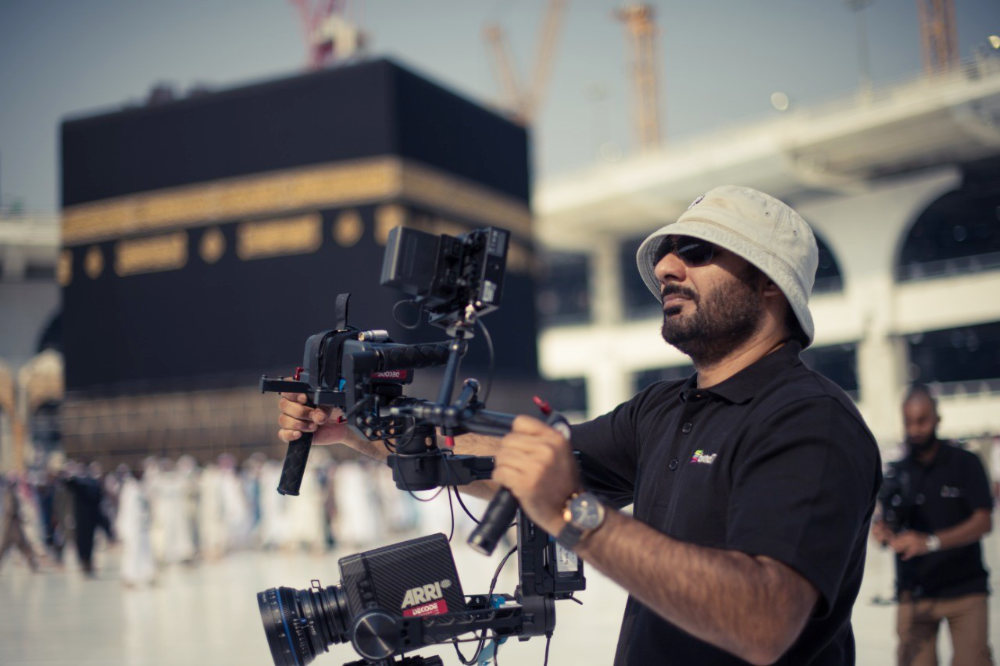ISLAMABAD: An acclaimed British-Pakistani filmmaker, Abrar Hussain, who has produced documentaries on the Grand Mosque of Makkah and Al-Aqsa Mosque, has told Arab News that his films aim to counter anti-Islamic narratives by offering rare glimpses into the religion’s cultural heritage.
Born in Islamabad, Hussain moved with his family to London in the late 1970s less than a year after his birth. Prior to becoming a documentary filmmaker, he worked as a series producer at the Islam Channel, and directed and produced the popular returning TV shows “Model Mosque” (2007) and “Faith Off” (2008).
In 2017, Hussain released his best-known work, “One Day in the Haram.” As only Muslims are permitted to enter Makkah, Islam’s holiest city, the film offered a glimpse inside the Grand Mosque in Makkah — showing how the world’s largest mosque is run and what the daily routines are like.
“Post 9/11, there was lot of media backlash against Muslims, especially in the UK and in Western countries, and I knew this is not the true portrayal of Islam,” Hussain told Arab News in an interview.
Filmmaker Abrar Hussain takes aerial shots of the Grand Mosque of Makkah, Saudi Arabia, in October 2017. (Photo courtesy: Red Face Films)
“I really felt that I needed to use my creative skills to do something to combat this. So, I started doing Islamic productions and I had very big success.”
Hussain’s new film, “One Night in Al-Aqsa,” premiered in London earlier this month. It shows Al-Aqsa Mosque in Jerusalem during Laylat Al-Qadr, a festival that commemorates the night when the first verses of the Qur’an were revealed to the Prophet Muhammad.
“Our film is all about promoting better and more tolerant understanding of Islam,” Hussain said.
Filmmaker Abrar Hussain wins the Media Award at the Hajj Awards for ‘One Day in the Haram,’ in London, UK, on Nov. 4, 2019. (Photo courtesy: Red Face Films)
In a review, the Guardian newspaper wrote that the film “interweaves awe-inspiring aerial footage of Al-Aqsa with intimate shots of the faithful.”
“Many of them are Palestinians from the West Bank who endure numerous Israeli security checkpoints, adding excruciatingly long hours to their journey. Indeed, the omnipresence of the Israeli occupation looms large over the convivial and moving scenes of worshippers praying or breaking bread at the end of their fast,” the Guardian said.
“This documentary is a valuable window into the lengths that Palestinians have to go to simply to celebrate their faith.”
For Hussain, the documentary, shot on a GBP200,000 ($268,000) budget in about 18 months, was an “incredible and phenomenal experience to preserve cultural heritage and Islamic history.”
“It is one of the most important places (in Islam) and a sense of pride for Muslims,” he said, adding that the aim of the film was to encourage people to come to Al-Aqsa for worship and to stand in solidarity with the Palestinian people.
British-Pakistani filmmaker Abrar Hussain films scenes for ‘One Night in Al-Aqsa’ in Jerusalem on May 28, 2019. (Photo courtesy: Red Face Films)
Funds generated from the film have been donated to Penny Appeal Palestine, the international humanitarian charity, which also contributed to its production.
“Through these funds, they will support other projects like this one, and provide health care, food, and other vital aid to the Palestinian people, mostly in Gaza,” Hussain said.
He added that his documentaries had already been watched by millions of people in cinemas, on airline entertainment systems and video on demand platforms.
“‘One Day in the Haram’ remained on Amazon Prime for two years and now it has been transferred to another platform in the US, called USHUB, which is streaming the film in over 200 countries worldwide,” the director said.
“One Night in Al-Aqsa” had already been screened in 12 countries, boasting “big success” in Britain, the US, Canada, South Africa and Australia. It was also shown in Saudi Arabia, Indonesia, Malaysia and Turkey.
“The Muslim audience has appreciated that someone went through all the troubles to make this film,” Hussain said.
For his next project, the filmmaker is going to return to Saudi Arabia.
“Another big project on which we are working nowadays is ‘A Day in Madinah’,” he said, adding that it will feature the Prophet’s Mosque in Madinah, the second-holiest city in Islam.




